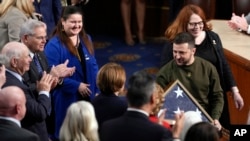On his way to Washington to meet with U.S. President Joe Biden, his first international trip since Russia’s invasion, Ukrainian President Volodymyr Zelenskyy, as reported by Euronews, stopped in Poland, a country that has become a key player in the war.
That visit and the support it represents carries huge meaning for Poland and other nations in the region ravaged by more powerful neighbors during two world wars.
Polish historian Lukasz Adamski of the Mieroszewski Center in Warsaw told VOA that from the point of view of Central European countries, Biden’s invitation to the Ukrainian president to visit the White House and have a one-on-one meeting highlight that this war is not only a war over Ukraine’s independence, but also over whether international law, including the United Nations Charter, should be the primary regulator of international relations.
“The fight to prevent the destruction of the achievements of civilized nations of the last 100 years and a return to an era in which one state can invade another, bite off parts of their territory or even conquer them completely. For the countries of Central Europe – victims of the imperial policies of Russia, Germany, and Austria – this is very important. For they see the validity of international law as the primary guarantee of their security,” Adamski said.
Zelenskyy was greeted as a hero at the White House and the U.S. Capitol.
In Western Europe, this visit is also seen as symbolic, a message to the world that the U.S. will continue to support Ukraine intensely in its fight for survival.
Observers in the region were pleased to hear Biden point to the need to “maintain NATO unity” when it came to arms supplies. “This strongly suggests that it is not the U.S., but other influential NATO states, that are not convinced of the need to support Ukraine even more intensively,” Adamski said.
In Ukraine, a country withstanding Russian aggression for over 300 days, Zelenskyy’s Washington visit symbolizes the unbreakable relationship between two countries honed by the war. It was very important for Ukrainians and Zelenskyy to convey the appreciation of the Ukrainian people for the unwavering support the U.S. showed to Ukraine during these difficult times, said Mykola Davydiuk, Ukrainian a political analyst and director at Think Tank Politics.
Zelenskyy’s words to Congress that U.S. aid to Ukraine is an investment in democracy and “not charity,” represent a view shared in Ukraine.
“We as Ukraine have to show that American investment in Ukrainian democracy and Ukrainian resistance against Russian autocracy really give good results. This visit shows that people of both countries share the same values and are ready to continue their friendship,” said Davydiuk.
Pavlo Klimkin, a Ukrainian diplomat served as minister of foreign affairs from 2014 until 2019, a time when Washington expressed support for Kyiv, but was hesitant to provide lethal aid to Ukraine.
He sees Biden’s invitation of Zelenskyy to the White House as a measure of the personal commitment of Biden to Ukraine’s victory.
“For President Biden, the containment of Russia and possible victory over the Russian regime has become personal, and it can become his biggest political legacy.”
He called the delivery of Patriot missiles a sign that the “ice has melted” between the country’s militaries. However, the former Ukrainian official said that Ukraine is getting enough today to defend itself but not yet enough to win, and this will be the biggest work ahead.

